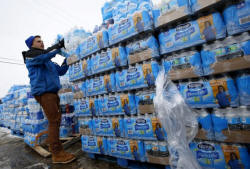|
 Legionnaires'
death tally in Flint area rises by 2, to 12 Legionnaires'
death tally in Flint area rises by 2, to 12
 Send a link to a friend
Send a link to a friend
[April 12, 2016]
(Reuters) - Michigan state health
officials on Monday attributed two more deaths to Legionnaires' disease
that may be related to the lead-contaminated drinking water crisis in
Flint, bringing the total to 12.
|
|
 The total number of cases in 2014 and 2015 was 91, according to the
Michigan Department of Health and Human Services. In January, it
reported 10 deaths and 87 cases. The total number of cases in 2014 and 2015 was 91, according to the
Michigan Department of Health and Human Services. In January, it
reported 10 deaths and 87 cases.
All of the new cases were identified by MDHHS personnel from
hospital testing data that was recently forwarded to the department,
it said in a statement. About half of the cases were connected to
the water crisis, Michigan officials have said.
Flint was under the control of a state-appointed emergency manager
when it switched the source of its tap water from Detroit's system
to the Flint River in April 2014 to save money.

The city switched back last October after tests found high levels of
lead in children's blood samples. The more corrosive water from the
river leached more lead from the city pipes than Detroit water did.
Lead is a toxic agent that can damage the nervous system.
Legionnaires' is a type of pneumonia caused by inhaling mist
infected with the bacteria Legionella. The mist may come from
air-conditioning units for large buildings, hot tubs or showers.
[to top of second column] |

Documents released in February show state officials knew about the
Legionnaires' outbreak and its suspected link to water system
problems in Flint at least 10 months before a public announcement
was made. Michigan auditors are probing the state health agency for
its handling of the crisis.
(Reporting by Justin Madden in Chicago, Editing by Ben Klayman and
Dan Grebler)
[© 2016 Thomson Reuters. All rights
reserved.] Copyright 2016 Reuters. All rights reserved. This material may not be published,
broadcast, rewritten or redistributed.
 |